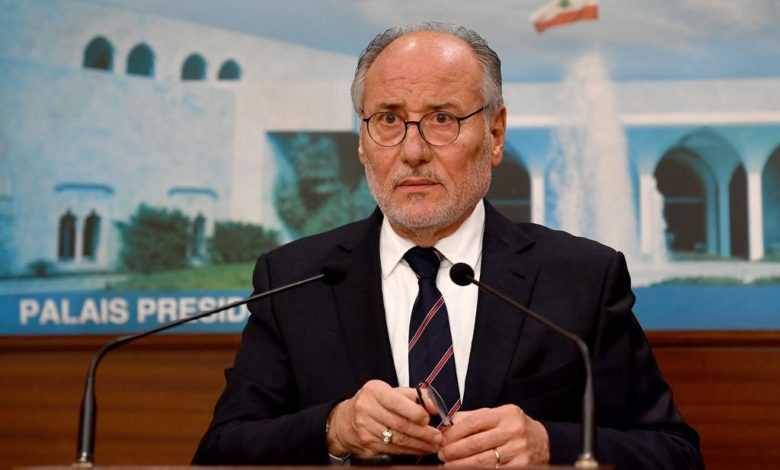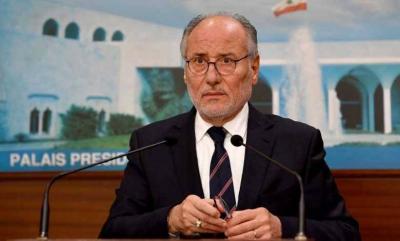Minister of Education in the caretaker government, Abbas Halabi, promised public sector teachers that they would receive their delayed payments by the end of September. Regarding other demands such as dollarizing salaries, he stated that this is "not possible because all other public sectors, including judges, military personnel, and public administration employees, will demand the same." Halabi said in an interview with "Lebanese Scene" on Al-Hurra channel: "There are demands that the state can meet or consider, while others cannot be fulfilled."
He added: "The most significant issues that are open for discussion, which the Prime Minister has taken into account, are increasing transportation and healthcare allowances. We are working with the Ministry of Finance to raise the value of the healthcare dollar." In response to a question about the delays in making such decisions, he said: "May God help the Minister of Finance; he is managing a bankruptcy with no government or cabinet, in what circumstances are we working?"
The Minister expressed hope that "the school year begins on the scheduled date," relying on "teachers' commitment to students and preserving public schooling." He stated: "We cannot afford for the school year not to start, and I have no choice." He pointed out that his warning that "the school year is at risk" arises from political instability and increasing collapse each day, stating, "We cannot isolate the education sector from the collapses happening in other sectors," confirming that all his efforts are aimed at avoiding reaching this stage.
He mentioned: "There is difficulty in securing the costs for electricity, heating, transportation, and meeting the needs and demands of teachers, hence I saw that we would reach a dangerous point." In response to a question, he said: "We are in a state of unannounced educational emergency, and we are in a permanent workshop at the Ministry of Education."
He emphasized "the importance of what donor entities provide to the educational sector," stating: "Last year, we spent $70 million in the public sector from donor entities, enabling us to pass a nearly normal school year in public education." He added: "We had given public education $90 last year as attendance incentives. The problem was that this money went to teachers' accounts in banks, and when the teacher went to withdraw it, he faced restrictions on withdrawal limits. Therefore, I say this year, if there are incentives—something that will become clear in the coming days—I ask the donors to pay teachers via OMT in fresh dollars."
Halabi revealed the private sector teachers' desire to dollarize tuition fees, saying: "When I announced that school administrations are not allowed to request dollars from parents, the teachers' union objected, claiming that this would prevent them from receiving part of their wages in dollars." He reiterated the standards he set that "tuition should be in Lebanese pounds, and the budget in Lebanese pounds, but schools need to buy diesel, ink, and stationery in dollars." He said: "If schools want to secure these costs in dollars and agree with parents’ committees on this, then we have no problem. However, if parents’ committees do not agree, then we as a ministry will act legally. The ministry can take measures such as refusing the budget or withdrawing the director's signature; they may be referred to the dispute resolution council, and I can request an external audit of the school and its budget. These are the available legal means I have. No one should expect that the ministry lacks deterrent measures."
He addressed private schools, saying: "This is not a time for profit but for saving the school, the student, and the educational system, and there are schools that responded." Regarding the percentage of teachers emigrating from Lebanon, the Minister estimated it "to range between 20% and 30% from both public and private education," clarifying that "in public education, there are many leaves without pay and numerous resignations." He noted that "in public education, there is a significant surplus," warning that "the emigration of competencies will lead to a decline in the quality of education."
Concerning the education of Syrian refugees in Lebanon, he revealed that "donor entities have reduced the budget allocated for their education and now pay in Lebanese pounds," expressing surprise at "the proposal circulated about the possibility of integrating Syrian education with Lebanese education," deeming it "misleading to the public and a media bomb aimed at discrediting the Minister of Education," rejecting any specification of the political party responsible for this deception.
About the crisis in the Lebanese University, Halabi pointed out that "the most critical issue it suffers from is political interference," stating: "This is the greatest calamity; I have sensed it, seen it, and lived it." He refused to specify the political entities involved, saying: "It is well known who controls the decisions in Lebanon; there are three or four entities that control the decision."
He indicated that there is "corruption in the Lebanese University," clarifying that "the university's budget, which equaled $250 million before the collapse, should have been invested better." On another note, Halabi doubted "the transparency of some obscure associations, whose activities we are unaware of, collecting money from UNICEF, claiming they will use those funds for education," confirming that "it would be better if this money and aid went to the public sector to carry out this task." He said: "I have a problem with these associations, which suddenly increased from 100 to 5000, collecting funds from donor entities without us knowing where the money goes, with one association claiming it repairs, another teaching, or treating. We have established a mechanism with donor entities to supervise every single dollar spent."




